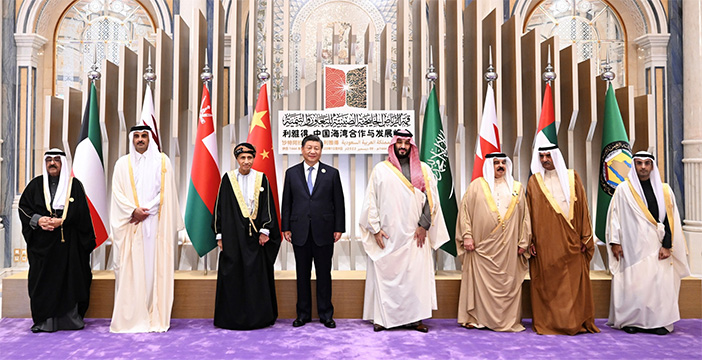 Xi Jinping at the China-GCC Summit, in Riyadh, 2022.
Xi Jinping at the China-GCC Summit, in Riyadh, 2022.
Photo: Xinhua News Agency
Oil-rich gulf monarchies are leveraging their wealth to deepen ties with China amid anxiety about the future of their longstanding security partnership with the US, Bloomberg informs.
Seven months after President Xi Jinping participated in the first China-Gulf summit in Riyadh, economic exchanges between the world’s second largest economy and nations like Saudi Arabia and the United Arab Emirates have been accelerating — moving well beyond crude purchases where Beijing has been dominant for years.
One of the deals that could benefit from closer ties in the coming months is Chinese-owned seed giant Syngenta Group’s planned $9 billion Shanghai IPO. The state-backed company’s advisers have been having discussions with Middle Eastern sovereign funds including the Abu Dhabi Investment Authority and Saudi Arabia’s Public Investment Fund about becoming cornerstone investors, people with knowledge of the matter have said.
The value of acquisitions and investments by Gulf companies in China has climbed more than 1,000% year-on-year to $5.3 billion, according to data compiled by Bloomberg. This year is on the cusp of becoming the busiest ever by number of such deals, the data show.
Abu Dhabi’s $280 billion sovereign wealth fund, Mubadala Investment Co., is ramping up operations in China to hunt for investments, people familiar with the matter said. Dubai has seen a 24% surge in Chinese companies setting up in its commodities free zone after roadshows in the Asian country. Officials in Riyadh describe China as an indispensable partner for Vision 2030 — Crown Prince Mohammed bin Salman’s multi-trillion-dollar economic and social transformation plan. A string of Chinese firms have won contracts for the futuristic city NEOM.
The relationship is also extending outside the economic front. At the December summit, Xi offered to mediate in talks between Iran and Saudi Arabia, leading to a landmark agreement in March restoring ties between the arch-rivals signed in Beijing.
Some in Washington are already raising concerns that China’s growing influence in the Middle East could challenge American interests in the long run. While the US remains the dominant military partner of Gulf states, US Central Command chief General Michael E. Kurilla, warned in recent congressional testimony of concerted Chinese efforts to undermine this, pointing to a jump in Beijing’s trade and military sales to the region.
Dissatisfaction with the decades-old US security umbrella had been brewing for at least 15 years in the Middle East, exacerbated by what Gulf states viewed as unpredictable US policies toward the region, said Hasan Alhasan, a Bahrain-based research fellow at the International Institute for Strategic Studies, who meets regularly with senior Gulf officials.
“Now they’re realigning their foreign policies to serve their economic agendas,” said Alhasan. “They’re going to prioritize relations that are going to serve their national economic visions.”
“I don’t ascribe to this zero-sum game,” Saudi Foreign Minister Faisal bin Farhan said in a June press conference with US Secretary of State Antony Blinken when he visited Saudi Arabia. “I think we are all capable of having multiple partnerships and multiple engagements, and the US does the same in many instances.”
China supports that approach. At a July conference at Beijing’s Tsinghua University, China’s former envoy to the Middle East, Wu Sike, urged the region to “pursue true multilateralism.”
Last month, thousands of entrepreneurs and government officials from China arrived in Riyadh for the largest ever Arab-Chinese business gathering. The Saudi government said MOUs worth more than $10 billion were signed.
Having alternative partners makes the Gulf powers less dependent on the US. In recent months, Saudi Arabia, the UAE and other producers in OPEC have repeatedly defied pressure to open the taps as the US sought to prevent oil prices from fueling inflation.
Trade, primarily in oil, remains the key to the relationship between China and the Gulf. Two-way commercial flows between Saudi Arabia and China ballooned to $117 billion last year from just $834 million three decades ago. UAE-China bilateral trade has grown almost a hundredfold to $107 billion in 2022 from $1.15 billion in 1992, according to data compiled by Bloomberg.
In his comments to Congress, US CENTCOM chief Kurilla said Chinese military sales in the region have risen by 80% during the past decade compared with a 30% decline in US sales. He warned of a “race between integration with our partners and Chinese penetration into the region.”
In May, the UAE said it had stopped taking part in US-led maritime patrols in the Gulf, which had been plagued by Iran’s seizure of oil tankers in prior weeks.
The UAE was upset at the US delay in bolstering military aid after the January 2022 Houthi missile strike on Abu Dhabi, western diplomats and UAE officials say. The less engaged the US is, the more space there will be for China, said one UAE official, asking not to be named because of the sensitivity of the matter.
A senior Saudi official said his country sees the need to cool down tensions with other countries in the region and find other partners to work with because it doesn’t see the US as a reliable security partner.
read more in our Telegram-channel https://t.me/The_International_Affairs

 11:12 20.07.2023 •
11:12 20.07.2023 •






















